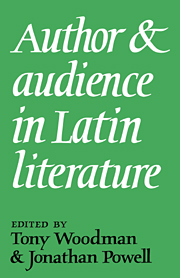Book contents
- Frontmatter
- Contents
- List of contributors
- Prologue
- 1 THE ORATOR AND THE READER: Manipulation and response in Cicero's Fifth Verrine
- 2 STRATAGEMS OF VANITY: Cicero, Ad familiares 5.12 and Pliny's letters
- 3 ‘SHALL I COMPARE THEE…?’: Catullus 68B and the limits of analogy
- 4 ATOMS AND ELEPHANTS: Lucretius 2.522–40
- 5 IN MEMORIAM GALLI: Propertius 1.21
- 6 THE POWER OF IMPLICATION: Horace's invitation to Maecenas (Odes 1.20)
- 7 THE VOICE OF VIRGIL: The pageant of Rome in Aeneid 6
- 8 FROM ORPHEUS TO ASS'S EARS: Ovid, Metamorphoses 10.1–11.193
- 9 POET AND AUDIENCE IN SENECAN TRAGEDY: Phaedra 358–430
- 10 PERSIUS' FIRST SATIRE: A re-examination
- 11 NERO'S ALIEN CAPITAL: Tacitus as paradoxographer (Annals 15.36–7)
- 12 AMOR CLERICALIS
- 13 EPILOGUE
- Notes
- Abbreviations and bibliography
- Indexes
8 - FROM ORPHEUS TO ASS'S EARS: Ovid, Metamorphoses 10.1–11.193
Published online by Cambridge University Press: 13 March 2010
- Frontmatter
- Contents
- List of contributors
- Prologue
- 1 THE ORATOR AND THE READER: Manipulation and response in Cicero's Fifth Verrine
- 2 STRATAGEMS OF VANITY: Cicero, Ad familiares 5.12 and Pliny's letters
- 3 ‘SHALL I COMPARE THEE…?’: Catullus 68B and the limits of analogy
- 4 ATOMS AND ELEPHANTS: Lucretius 2.522–40
- 5 IN MEMORIAM GALLI: Propertius 1.21
- 6 THE POWER OF IMPLICATION: Horace's invitation to Maecenas (Odes 1.20)
- 7 THE VOICE OF VIRGIL: The pageant of Rome in Aeneid 6
- 8 FROM ORPHEUS TO ASS'S EARS: Ovid, Metamorphoses 10.1–11.193
- 9 POET AND AUDIENCE IN SENECAN TRAGEDY: Phaedra 358–430
- 10 PERSIUS' FIRST SATIRE: A re-examination
- 11 NERO'S ALIEN CAPITAL: Tacitus as paradoxographer (Annals 15.36–7)
- 12 AMOR CLERICALIS
- 13 EPILOGUE
- Notes
- Abbreviations and bibliography
- Indexes
Summary
Ovid's awareness of his audience is evident on almost every page. Sometimes, as when he wanted to compare the best parts of heaven with the smartest parts of Rome, he wondered whether the reader might disapprove:
hie locus est quern, si uerbis audacia detur,
haud timeam magni dixisse Palatia caeli.
(Metamorphoses 1.175–6)Sometimes, as when he describes how Deucalion and Pyrrha have happened to land on Parnassus during the flood, he pauses fussily to ensure that the audience has understood: (nam cetera texerat aequor) (1.318). Sometimes, as when he is about to tell how the stones thrown by Deucalion and Pyrrha will turn into men, he uses a parenthesis to acknowledge possible incredulity: (quis hoc credat, nisi sit pro teste uetustas?) (1.400), and it would be no hard task to add further examples and further categories. It seems especially promising, however, in pursuit of our theme, to turn to the story of Orpheus who, as a poet and a lover, must have had a special place in Ovid's affections and whose story also provided him with an obvious opportunity to vie with Virgil. Whenever a poet evokes the memory of a famous predecessor he must be thinking of his audience and appealing to them through a shared literary inheritance. And there is an extra reason for turning to Orpheus here: in May 1985, David West read to the A.G.M. of the Joint Association of Classical Teachers a paper entitled ‘Orpheus and Eurydice’.
- Type
- Chapter
- Information
- Author and Audience in Latin Literature , pp. 124 - 137Publisher: Cambridge University PressPrint publication year: 1992
- 2
- Cited by

